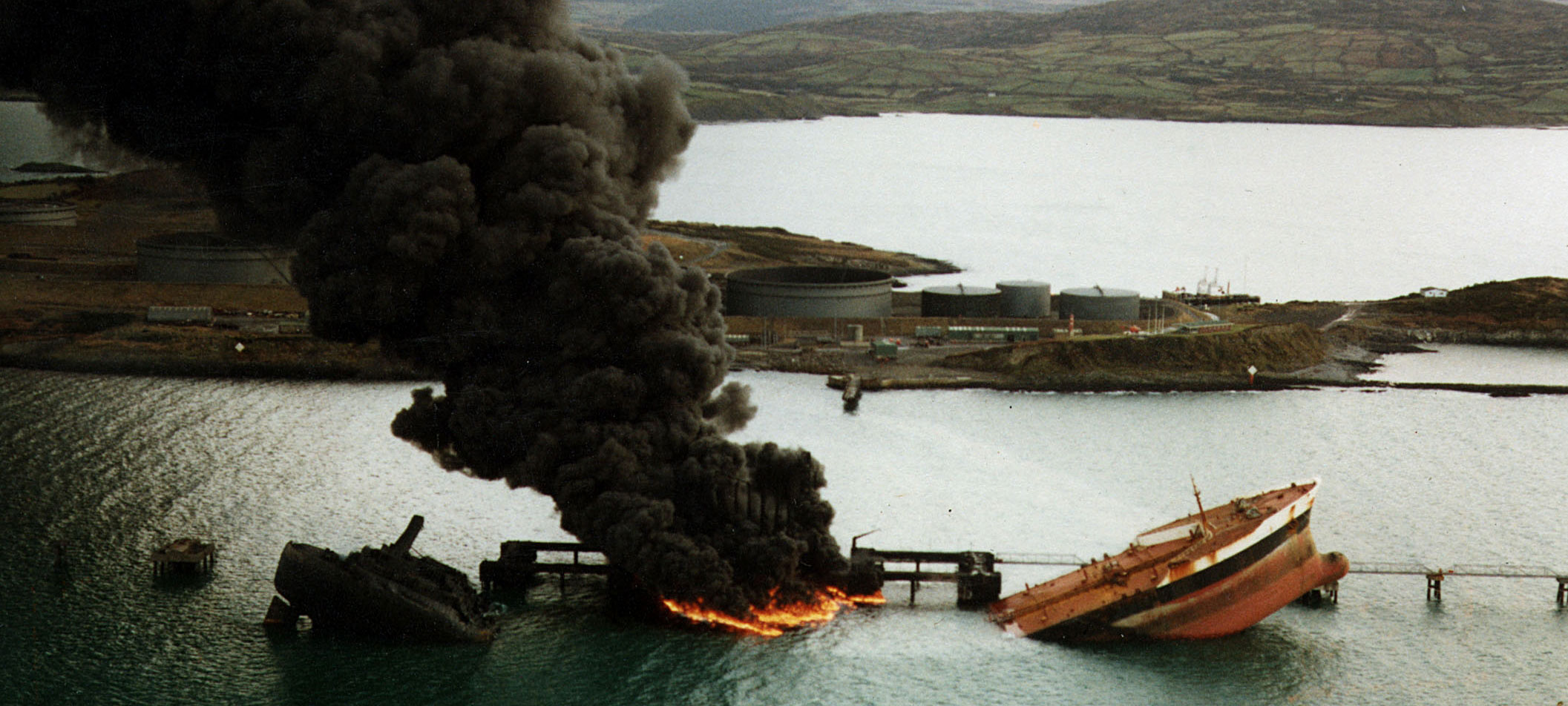
Hundreds of people paid tribute in January to the 50 who died four decades ago in one of Ireland's worst shipping disasters, with relatives warning that lessons from the accident still need to be heeded…
'Never forget' was the refrain in January as ceremonies were held to mark the 40th anniversary of Ireland's worst modern maritime accident.
A total of 50 people died when a series of explosions ripped through the 121,432dwt tanker Betelgeuse while it was discharging a cargo of Arabian crude at the Gulf Oil terminal on Whiddy Island in the Bay of Bantry on 8 January 1979.
Eyewitnesses first spotted a small fire just forward of the ship's manifold at around 0030hrs, and, within the space of just 10 minutes, the flames had swept across the vessel. Barely 20 minutes after that, a series of explosions split the tanker's hull, separating the No. 5 and 6 tanks and igniting much of the oil remaining onboard.
With the conflagration reaching a height of up to 300ft and temperatures estimated to have exceeded 1,000°C, the concrete unloading jetty crumbled. Firefighters were unable to get near the vessel and had to direct their efforts into preventing the blaze from spreading to the tanks ashore.
All of the Betelgeuse's 41 French crew were lost in the disaster, along with the wife of one crew member, the ship's pilot, a cargo inspector, and six shorebased staff. A Dutch diver involved in the wreck removal operation was a later victim.
Built for the French oil company Total, Betelgeuse had been one of the biggest ships in the world fleet when launched and was barely a decade old at the time of the accident.
But an investigation commissioned by the Irish government into the causes of the disaster found that the ship was in a very poor state – with the structure being 'abnormally, seriously and significantly wasted due to corrosion'.
It is hard to explain the enormity of the pain the relatives have suffered – 23 of the French bodies were never recovered

It was subsequently estimated that the wastage in the steel plating of the ballast tanks was as much as 40%.
The investigation report concluded that 'an important cause of the excessive corrosion was Total's decision not to renew the cathodic protection in the permanent ballast tanks and/or its failure to have the tanks coated with a protective coating'.
The oil major was also criticised for its 'conscious and deliberate' decision not to renew seriously wasted longitudinals and other parts of the permanent ballast tanks when Betelgeuse was in dry dock in 1977. Total had failed to maintain Betelgeuse properly because it was planning to sell the ship as a result of the poor state of the tanker market at the time.
The 480-page investigation report also noted the adverse impact of unloading and ballasting procedures on the tanker's 'seriously weakened' hull.
The crew had commenced ballasting before discharge was complete, but Betelgeuse had no loadicator to help them calculate the stress moments. The investigation concluded that the stresses caused by the ballasting had exceeded the critical buckling range in some of the ballast tank deck and sideshell longitudinals.
As the longitudinals failed, a sequence of disastrous events took place. The deck and side-shell plating began to buckle and this was followed by progressive failure of the hull. Sparks from the tearing steel or severed electrical cables ignited vapours in the ballast tanks, and the explosions resulted in the failure of the bottom plating and the fracture of the hull.
Maritime lawyer Michael Kingston lost his father, Tim – a pollution control officer – in the disaster. Mr Kingston is now vice-president of the French and Irish association of the relatives and friends of the Betelgeuse, which organised last month's memorial event in Bantry, including a ceremonial mass and wreath-laying at the Betelgeuse memorial monument.
'This was a very important commemoration of a terrible maritime tragedy,' he said. 'It is hard to explain the enormity of the pain the relatives have suffered – 23 of the French bodies were never recovered.'

Mr Kingston – who has been involved in the development of the IMO Polar Code and of safety measures in response to the Costa Concordia and Deepwater Horizon disasters – said he hoped the anniversary event would also serve as a 'positive acknowledgement' of the way the Betelgeuse tragedy had helped to improve safety standards in the shipping industry.
This was a disaster that should never have happened, he said. 'The failures that took place – both on the ship, and at the oil terminal – were some of the worst derelictions of duty in relation to safety in world maritime history.
'Working first hand in international maritime regulation, I cannot emphasise enough the impact and importance of lessons learned from the Whiddy Island disaster and the sacrifice of those who died and the positive change that it has led to,' he added.
One of the biggest lessons from the disaster is the importance of proactive safety initiatives by governments and industry, Mr Kingston said. Betelgeuse was not equipped with an inert gas system, he pointed out, even though their carriage on oil tankers had been agreed by the IMO in 1974.
Had Betelgeuse been equipped with an inert gas system, and had the No. 5 and 6 tanks been inerted, experts consider that the final, fatal, explosion which spilt the ship's hull would almost certainly have been prevented.
'Inert gas systems were not carried onboard Betelgeuse because the 1974 SOLAS Convention had not then been ratified by enough national legislatures,' Mr Kingston pointed out. 'In the absence of regulation, best practice in the industry was not applied. After the Whiddy Island disaster, Ireland ratified SOLAS 1974 and consequently the world brought it into force.
'It is extremely important to acknowledge this and to highlight the importance of always adhering to best practice in the absence of regulation – throughout all industry sectors,' Mr Kingston added.
Even now, he added, there are 'quite staggering' examples of government complacency on safety issues, and Ireland is among a number of countries that have so far failed to ratify the 1993 international convention for the safety of fishing vessels or the 2007 convention on the removal of wrecks.
'Unfortunately, very often in the slow regulatory process, it takes another disaster to implement previously suggested regulation where industry continues to ignore recommendations,' he pointed out.
Tags
